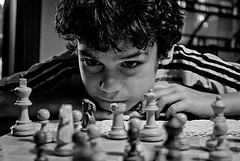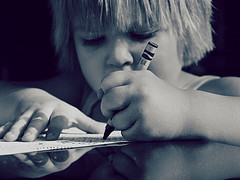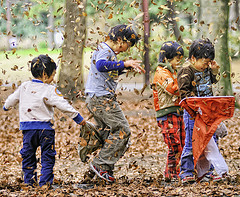Anxiety. Stress. Depression.
You’ve probably experienced at least one of these emotional states at least once in your life – and probably wasn’t a pleasant experience. Now consider that these all-too-human emotions, such as anxiety — which affects about 18% of Americans, according to the National Institutes of Mental Health — may be even more pronounced among children classified as gifted.
A 2009 study from Hungary’s Semmelweis University actually found an association between high academic performance, creativity, and the T/T genotype, a gene that’s been linked to an increased risk of psychosis – all of which may help to explain exactly why conventional wisdom tells us that gifted individuals tend to be more prone to anxiety and stress.
As such, gifted children have long been associated with a tendency toward stress and depression – a link that leads many parents to ask if their gifted child experiences higher levels of anxiety than other children.
But the answer to this question isn’t black or white. As with any mental illness or condition, a number of factors, from personality traits to temperament, intelligence to environment — may contribute to increased anxiety. In order to understand the link between gifted children and anxiety, it’s essential to determine what exactly “gifted” means.
What Defines a Child as “Gifted?”
 In the early 1920s, psychologist Lewis Terman advocated for the use of I.Q. tests to identify gifted students. Terman’s classification system – which is still used by many schools in the U.S. today – identified gifted students as those with I.Q. scores of 135 and up.
In the early 1920s, psychologist Lewis Terman advocated for the use of I.Q. tests to identify gifted students. Terman’s classification system – which is still used by many schools in the U.S. today – identified gifted students as those with I.Q. scores of 135 and up.
In 1972, the Marland Report to Congress broadened the definition of gifted to include students capable of high achievement in a range of areas, including creative, intellectual, artistic and leadership, who require services above and beyond those normally provided by a school in order to realize their full potential.
As there’s no federal standard, schools may use a range of tools to identify and evaluate giftedness. These can include tests such as:
- Stanford-Binet Intelligence Scales
- Wechsler Preschool and Primary Scale of Intelligence-
- Slosson Full-Range Intelligence
- Kaufman Brief Intelligence Test
- Woodcock-Johnson III Tests of Cognitive Abilities
Classroom teachers may also identify gifted children. According to researcher Jane Rohrer, educators tend to evaluate both affective style – or an intense, unique “spark” – and exceptional intellectual or academic ability.
Parent and educators may notice signs of giftedness that include:
- Colorful imagination
- Large vocabulary
- Early and rapid progression through developmental milestones
- Creative problem solving abilities
- Compassionate toward others
- Emotionally intense
- Keen memory
- Exceptional observation skills
- Unusually alert
- Concern with justice and fairness
- Enjoys learning
- Learns quickly and easily
Further adding to that complex gifted mix, Dr. Barbara Clark of California State University Los Angeles notes that gifted children tend to have intense, sensitive natures. She summarizes characteristic traits such as:
- Heightened self-awareness that’s accompanied by feelings of “being different”
- Sensitivity to other’s feelings and expectations
- High expectations for others and self, often leading to frustration
- Early and advanced sense of justice or idealism
- Well-developed sense of moral judgment
- Sensitivity to differences between stated ideals and actual behaviors
Do “Gifted” and “Anxious” Go Hand in Hand?
 These special traits can combine to form sensitive, bright and intense personalities capable of processing vast amounts of information from their environments. However, this ability to take it all in may also lead to what some researchers, such as Polish psychiatrist Kazimierz Dabrowski, describe as “overexcitability.”
These special traits can combine to form sensitive, bright and intense personalities capable of processing vast amounts of information from their environments. However, this ability to take it all in may also lead to what some researchers, such as Polish psychiatrist Kazimierz Dabrowski, describe as “overexcitability.”
Overexcitability, which Dabrowski defined as “enhanced and intensified mental activity, reactions, and expression that are beyond common and average,” has a number of consequences. Dabrowski believed that when this heightened reactivity is paired with heightened abilities and talents, it may lead to “extraordinary development.”
Sounds good, right?
Well… kind of. “Extraordinary” is just a fancy way of saying “not ordinary.” And when kids develop faster in some areas than others, it can really place them out of sync with their peers, their families, their teachers and their classmates.
A child who is operating at an advanced intellectual, emotional or imaginational level may find it difficult to fit in. When compared to their peers, gifted children may have different interests, hobbies, ways of expressing themselves – in fact, they may just seem like they’re operating on a whole other level. That can make fitting in, making friends, and feeling “normal” almost impossible, all of which can lead to anxiety and depression, according to P. Susan Jackson, founder of the Daimon Institute for the Highly Gifted.
Asynchronicity, or uneven development, is another trait common to many gifted children. Often, cognitive development will leave physical or affective development in the dust, resulting in even more “out of place” feelings – and more potential for anxiety. In fact, University of Virginia researchers Tonya Moon and Catherine Brighton’s study of how educators conceptualize giftedness found that — along with advanced language proficiency and exceptional reasoning skills — teachers often rank sensitivity and asynchronous development as common characteristics among gifted kids.
For instance, your five-year-old may have the abilities and interests of a much older child, leading them to seek out older kids for companionship. However, your child’s social and physical development is still that of a five-year-old, leading to rejection from older children who don’t want to play with “little kids.” Your bright five-year-old doesn’t quite fit in anywhere, leading to feelings of social isolation.
In addition to not fitting in with their peers, gifted children’s heightened awareness, empathy, compassion, commitment and creativity can also set them up for disappointment, when those around them just can’t measure up. As a result, many gifted children may experience frustration, isolation and higher levels of stress and anxiety, as noted in a 2011 study by Harrison, et al.
Many gifted children place very high expectations on themselves. While common, this characteristic can cause any number of problems, both at school and at home. From worrying over unmet goals or an assignment that’s just not “perfect” enough, the constant need to reach exceptional levels of achievement can also lead to anxiety and stress, according to educational psychologist Jerry Schecter.
And, as a study by Providence College’s Michael Fimian suggests, gifted children’s higher susceptibility to stress may result in a number of symptoms, such as withdrawal, inactivity, or burnout – which means it’s essential that parents recognize symptoms.
How Can I Tell if My Gifted Child Suffers From Anxiety?
Anxiety in gifted children manifests itself in a number of ways. Symptoms may include:
- Inability to relax
- Tension
- Competitiveness
- Irritability
- Withdrawal and alienation from peers
- Complaints of fatigue, stomachaches, headaches and other vague illnesses conveniently timed to avoid situations or tasks
- Underachievement; trying to hide their talents and abilities
- Arrogance and impatience
- Changes in temperament or attitude
- Unprompted or inappropriate outbursts, tantrums or withdrawal
- Insomnia or excessive sleeping
- Lack of enthusiasm or carelessness
- Inability to concentrate, fidgeting and other “hyper” behavior
- Excessive asthma or allergy attacks
- Problems with elimination
- Persistent worrying
- Changes in eating habits
- Shaking, trembling and sweating
- Rapid breathing
- Nausea
How Can I Help My Gifted Child Deal with Anxiety?
 If your child is dealing with anxiety and stress, consider some of these helpful steps.
If your child is dealing with anxiety and stress, consider some of these helpful steps.
Teach Coping Skills
Though totally eliminating anxiety may be an impossible task, parents can help their gifted children to manage anxiety and turn it into a tool. Clinical child psychologist Maureen Neihart suggests these techniques:
- Practice deep, controlled breathing before or during stressful situations: Have your child place one hand under their belly button and the other on their chest while taking deep, slow breaths. When done properly, their bottom hand will move farther out than the top hand.
- Learn to relax by tensing then relaxing their muscles: Have your child clench their fists for five seconds, then open them slowly for 10 seconds. Apply this technique through all the major muscle groups in the body, from arms to toes, in order to reduce tension
- Help your child overcome their fears: Though it may be easier to swoop in and rescue your child from anxiety-inducing situations, it’s actually more beneficial to encourage controlled, incremental steps toward overcoming their fears
Encourage Positive Social Interactions
For many gifted children, especially those who tend toward shyness, social interactions may lead to anxiety. According to Dr. Jill Burness, factors such as fear of being evaluated, a tendency toward self-criticism, perfectionism or hypersensitivity, and even simply being singled out as gifted can all exacerbate feelings of anxiety and stress.
Help your gifted child develop social skills by:
- Role-playing social situations with your child to prepare them for real life encounters
- Acting as a buffer in sensitive or difficult situations
- Teaching children positive self-talk to temper self-criticism
- Providing additional time to prepare for social events, presentations or displays of abilities
Utilize Available Tools and Resources
There’s many wonderful books and programs for child anxiety such as what we offer and others, so take advantage of using a predefined system that’s been optimized to make it easy for parents like you to help their kids.
Stimulate Creativity
Creativity may be a defining characteristic for many gifted children, but it’s also among the most fragile, according to Carol Morreale, President of the Illinois Association for the Gifted. Our society tends to value productivity above creativity, so it falls to parents to nurture and stimulate this important trait in their gifted children.
Help promote your child’s creativity by:
- Differentiating between creativity and disorder by providing a structured discipline – such as art or music — in which to explore the child’s interests
- Providing access to materials, supplies and resources that further creative exploration
- Withholding judgment on the product of creative activity; instead, encourage the activity itself, as even praise can influence and stifle children’s natural exploration of their creative impulses
- Limiting TV and screen time; instead, spend time imagining and conversing with your child
- Modeling creativity by exploring your own interests
- Allowing children to solve problems for themselves and to make their own aesthetic judgments
Promote Both Emotional and Cognitive Intelligence
For many gifted children, cognitive intelligence develops quickly – while emotional intelligence develops at a more typical rate. According to Dr. Sandra Ma of Northwestern University, when parents make a special effort to nurture emotional intelligence, their children have a better chance of gaining confidence and feeling emotionally secure.
You can help nurture your child’s emotional intelligence by:
- Providing them with ways to articulate their feelings, as they may not be able to express their emotions and experiences clearly
- Offering access to non-competitive, extra-curricular activities that allow them to explore their interests without the pressure to achieve good grades
Gifted children’s unique traits make them special – but can also cause anxiety and stress. The good news is that with a bit of help from parents, these characteristics also offer the potential amazing life experiences and achievements.
Above all, let your child know that you value them for who they are, and not just for what their talents allow them to accomplish or produce. Allow your child to explore the possibilities their talents represent, all while providing a safe environment where they can push their limits without fear of judgment.
Photo Credits: ajpscs, Ekler, Carlos A. Aviles





